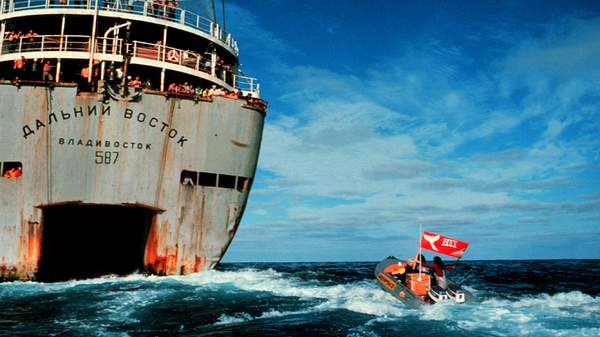Overview
Everyone might dream of changing the world, but few people actually try to do it. Bob Hunter strove to fall into the latter category. Even if you don’t know his name, you know about the results of his efforts. And even if you do know his name, you might not know his full story.
In the late 1960s, in the aftermath of the United States announcing plans to perform nuclear tests off of the Alaskan coast, Hunter was driven to do something. A journalist covering environmental issues in Vancouver, he delved into the city’s community of so-called tree huggers and draft dodgers haunted by the thought of a dying planet, and helped form a group to protest the forthcoming injustice. In their actions, a movement was born, as well as an organisation that still endures nearly half a century later. They wanted to make a real difference. They became Greenpeace.
Progressing with polish and patience, How to Change the World tells their tale. To do so, the rousing film uses a remarkable amount of archival footage capturing eager early times, intercuts modern-day interviews with important figures reminiscing about their experiences, and employs Hunter’s own words — as voiced by actor Barry Pepper — as narration.
The documentary that results offers a primer on the intense but messy background of an outfit now synonymous with environmental activism, including the cause of saving the whales that they would swiftly adopt. It also offers an insight one of the men crucial in shaping both an influential gathering of likeminded folks determined to bring attention to ecology, and a way of enacting awareness about atrocities committed against the natural world.
As the film lists Hunter’s how-to rules — among them, planting a mind bomb (i.e. going viral, in today's terms) and putting your body where your mouth is — and then offers evidence of each from his history, where its sympathies fall is never in question; an expose, this is not. And yet, writer/director Jerry Rothwell isn’t annoyingly overt in his fondness for the idealism he charts, letting the results of Hunter and Greenpeace’s exploits do the talking. Vision of the sights that spurred them to act, especially involving animals, is both difficult to watch and difficult to not want to react to.
That a strong push for audiences to do their part becomes clear isn’t surprising, particularly given the passion on display. That focus also shifts to the issues that plagued some of the founders is similarly expected; the film might chart the feats of a now well-known organisation, but it is about people first and foremost. People dream and attempt to achieve their desires — and they also clash with each other as they confront the task of saving the planet. Even attempting to change the world, and endeavouring to understand those who try to, can’t quite alter that.
Features
Information
When
Thursday, September 17, 2015 - Wednesday, October 7, 2015
Thursday, September 17 - Wednesday, October 7, 2015
Where
Dendy Newtown261-263 King Street
Newtown
